Do you really need all that protein for health even if you’re not into working out?
Is consuming more protein all you need to lose weight, build bigger muscles, and stay active and healthy in old age? Just how much protein is too much?

(Photo: iStock/Prathan Chorruangsak)

This audio is generated by an AI tool.
You don’t have to train for Hyrox or be an F45 junkie to be aware of protein these days. Once the domain of bodybuilders, this macronutrient has shifted into the general public’s lexicon to become a catch-all panacea.
Want to lose weight? Eat more protein. Need that lean, shredded physique stat? Load up on chicken breast and eggs. Trying to stop your late-night snack raids? Chow down a steak or tofu at dinner. Even your ah gong and ah ma are encouraged to up their protein intake.
Regardless of age, gender or dietary restrictions, we can’t seem to get enough of this muscle-building and repairing nutrient. Non-vegetarian protein proponents might even acquiesce to chew a leather belt if it had a “high protein” label slapped on it.
So, why have we pivoted from the greasy ways of the ketogenic diet and its ilks to protein? The growing interest in high-intensity activities such as Hyrox, Spartan races, CrossFit and bouldering could have fuelled the demand for more protein to support muscle growth and maintenance, said Jaclyn Reutens, a clinical and sports dietitian with Aptima Nutrition & Sports Consultants.
And that demand is met by “F&B businesses popping up near fitness centres and even food delivery services offering nutrition information on their meals for customers to make informed choices”, she said.
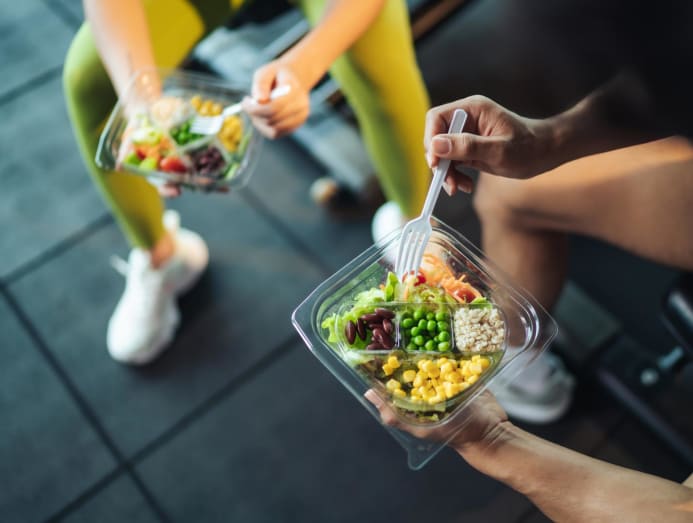
Other “possible reasons for the increased emphasis on protein options, portion, labelling and tracking could be due to the popularity of dietary trends, and appealing to health-focused consumers who associate protein with better nutrition”, said Diane Seto, a senior dietitian from Mount Elizabeth Hospital.
Even the elderly are roped in. “As we age, our bodies require more protein to maintain muscle mass and strength,” said Mary-ann Chiam, the senior principal dietitian at Allium Healthcare. “Highlighting the protein content in menus helps older adults to make informed choices to meet their nutritional needs.”
With all that emphasis and easy access to protein, can there be a flipside? Before you ask for an extra serving of chicken at the economy rice or nasi padang stall, we find out more from the dietitians.
FIRST, HOW MUCH PROTEIN IS ENOUGH?
It depends on a few things. One: Age. The average, healthy adult from ages 18 to 49 requires about 0.8g of protein for every kilogramme of body weight (g/kg) each day, according to Chiam. “For example, a 70kg person should aim for around 56g of protein daily.” FYI: Three eggs or four pieces of tempeh can provide 20g to 25g of protein.

This requirement changes as we age, said Chiam. In your 30s, the aforementioned formula still works to help maintain your muscle mass and overall health. But by the time you roll into your 40s, “some experts suggest slightly increasing protein intake to about 1g/kg per day to help counteract age-related muscle loss and support overall health”, she said.
When you hit your 50s, it is a good idea to further increase your protein intake to 1.2g/kg each day, said Chiam. “Older adults are more prone to muscle loss (also known as sarcopenia) and may need more protein to maintain muscle mass and strength.”
Two: Activity level. If you’re training for strength, you’ll have to double your protein to 1.6g/kg to 2g/kg, according to this link shared by Reutens. “There are many protein tables and formulae available. This one is more sound as it doesn’t recommend going beyond 2g/kg, which is too high,” she said.
For regular and moderate-intensity exercises such as cycling, you could increase your protein intake to 1.2g/kg to 1.5g/kg. If light activities such as shopping, doing household chores or strolling at Bishan Park count as your workout, there’s no need to ask for an extra helping of meat or tofu at all. “For most of us, our protein intake shouldn’t exceed 1.5g/kg,” advised Reutens.
Three: Health events. “Adults with medical conditions like cancer or renal disease will need different protein requirements,” said Chiam. Speak to a dietitian if you're uncertain of the different protein need you have as a patient.

Pregnant women are another example, said Seto. They need “extra protein to support the growth of the baby and the placenta as well as to handle the increased blood volume and changes in the body”, she said. That means consuming 1.1g/kg each day. “The protein requirements are even higher for multi-foetal gestations: An extra 25g per day on top of the daily protein requirements for regular pregnancies,” said Seto.
As with everything in life, you can have too much of a good thing when it comes to protein. For one, no matter how exalted protein is among the fitspo crowd, the excess amino acids are still going to be stored as fat by your body.
Health-wise, extra protein intake can lead to elevated blood lipids and heart disease because high-protein foods tend to be high in total and saturated fat. And you can’t ignore the fact that too much protein can tax the kidneys and pose an additional risk to people predisposed to kidney disease.
If you’re confused by just how much protein you should consume daily, it’s best to consult a dietitian to help you figure it out, especially if you have health concerns.
CAN INCREASING OUR PROTEIN INTAKE HELP WITH WEIGHT LOSS?
There is research that suggests eating more protein than you need may promote weight loss. For instance, a 2017 study found that those who ate a high-protein diet of 1.34g/kg for more than 75 per cent of the six-month duration experienced significantly more weight loss than the group who followed dietary requirements.
Meanwhile, eating like a gym bro (up to 1.6g/kg per day), according to a 2015 review, helped promote weight loss, reduce body fat and maintain muscle mass.
A reason why protein is heralded as a weight watcher’s ally is because a higher intake of this macronutrient increases levels of the appetite-reducing hormones GLP-1, peptide YY and cholecystokinin, while reducing levels of the hunger hormone ghrelin, according to Healthline.
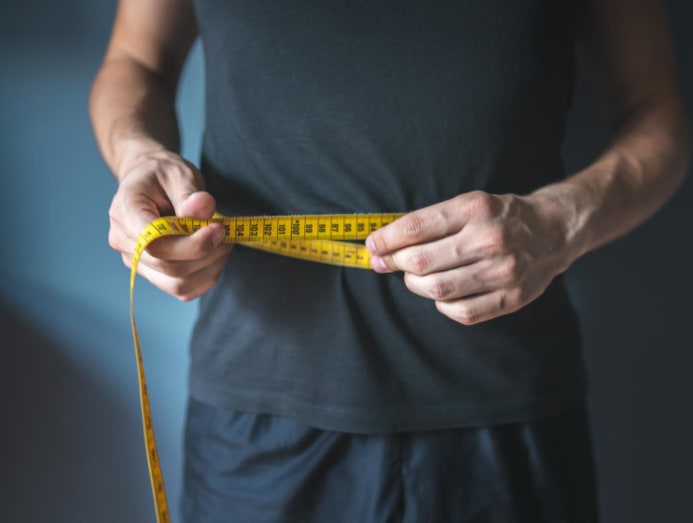
In addition, protein takes longer to digest than other nutrients. In turn, you feel full longer, so you’re less likely to raid the kitchen for snacks. In one study, people who ate high-protein diets went longer between meals and ate less at meals.
Another plus point about having more protein is that it has a higher thermic effect of food or TEF, which means your body burns more calories digesting and absorbing protein than it does carbohydrates, said Annalise Pratt, a dietitian with Cleveland Clinic.
But don’t use the above research as an excuse to order extra bacon at brunch to boost your protein intake. It still boils down to the fundamentals when it comes to weight loss: Your caloric balance, reminded Seto. “Simply eating more protein won't lead to weight loss, unless you're also managing your overall caloric intake and ensuring you're in a calorie deficit.”
In general, said Pratt, make sure 10 per cent to 35 per cent of your daily calories come from protein. “And you should burn 500 calories more than what you eat each day if you want to lose weight.”
Can an increased protein intake help with mental health?
It can, said Adjunct Professor Douglas Kalman at the recent The Strength Summit in Singapore. He teaches Sports Nutrition and Sports Supplements at Nova Southeastern University's Exercise Sciences Department in Florida, US.
The transmission of signals between neurons relies on the controlled release of neurotransmitters (such as tryptophan, serotonin, dopamine and norepinephrine), many of which the body makes from the various amino acids that you get from protein-rich foods, he said.
For instance, your body uses tryptophan found in turkey, tuna and chickpeas to create serotonin, the “feel good” hormone. The amino acid L-tyrosine in chicken is synthesised by your body to produce dopamine, which when low, can lead to depression, ADHD and Alzheimer’s.
"The body requires 20 amino acids and the potential for combining these amino acids creates an almost infinite number of possible neurotransmitters," he said.
ARE PROTEIN SHAKES BETTER THAN NATURAL FOODS?
You don’t generally need protein shakes if you’re a weekend warrior or playing sports recreationally, said Reutens. “You are able to meet your protein needs through food.” So, don’t let sexy marketing campaigns and taut wellness influencers tell you that you need those beverages. And certainly don’t let them convince you to ditch natural foods for those powders.
“Protein powders are synthetically derived, whereas in natural foods, the protein is better absorbed due to the presence of other nutrients such as carbohydrates, fats, vitamins and minerals,” said Reutens. “Protein powders are also not well regulated by authorities as there are no well-defined standards. You take your own risk when purchasing them.”
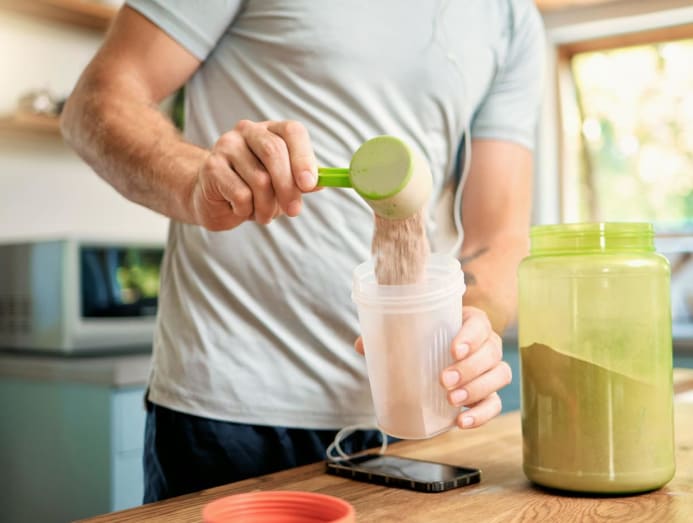
If you are convinced that you need to gulp a shake post-workout, it is useful to know that most protein powders offer anywhere between 10g and 30g of protein per serving, said Reutens. And there are various types – whey, casein, pea, soy and rice being the more popular ones – to suit your dietary requirements. For example, if you have digestive issues and bloat easily, avoid milk-derived whey and casein. Allergic to soy? Skip soy protein isolates.
Interestingly, said Reutens, “some studies have found that whey and whey protein isolates have been linked to accelerate hair loss in those already experiencing hair loss”.
But don’t replace all your meals with protein shakes. We get it. You’re rushing home or to the office after a workout and don’t have the time to grab a bite. Moreover, these beverages can be pretty filling and are easy to whip up.
The occasional protein shake lunch is okay, said Reutens. “Just remember to drink a lot of water” as “the long-term intake of protein powders can lead to kidney stones, especially from whey protein”.
DO WE CONSUME PROTEIN ONLY AFTER WORKING OUT?
“The evidence generally supports consuming protein after exercise because it aids in muscle repair and growth,” said Seto. When you eat protein, your body breaks it down into smaller building blocks called amino acids. “These amino acids are used to repair and build new muscle fibres that were damaged during exercise,” she explained.
Pre-workout, you are better off prioritising carbohydrates rather than protein, said Seto. Carbohydrates are “generally more important for providing energy to fuel exercise, especially for intense or prolonged workouts”. If you’re keen to incorporate protein before a session, “a small to moderate amount with carbohydrates a few hours before can help fuel your workout”, she added.
But, the best approach is to spread protein intake throughout the day; you can have a lean protein in each meal and snack every few hours, said Seto. “This ensures a steady supply of amino acids for muscle repair and growth because muscle protein synthesis and breakdown occur throughout the day, not just post-exercise.
“While consuming protein shortly after a workout does help support muscle recovery, maintaining an adequate overall daily protein intake with an even distribution is important,” said Seto.
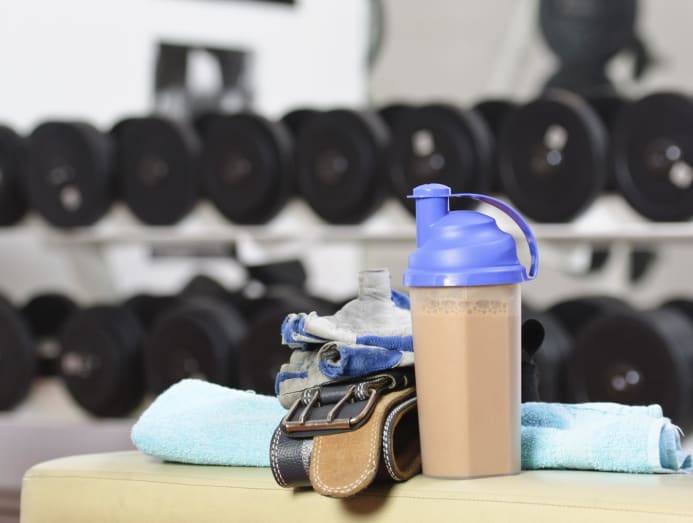
ARE PLANT SOURCES OF PROTEIN NOT AS GOOD AS ANIMAL SOURCES?
Both plant and animal proteins can be effective but they differ in some aspects, said Chiam. For example, their amino acid profiles.
“Animal proteins generally contain all essential amino acids in the right proportions, making them complete proteins,” said Chiam. “Most plant proteins are incomplete, meaning they may lack one or more essential amino acids. However, by consuming a variety of plant proteins, you can still get all essential amino acids.”
Contrary to popular belief, animal proteins tend to be more easily digested and absorbed than some plant proteins, said Chiam. As a result, you’ll need to eat more if you’re relying on plant protein.
“For instance, it’s commonly recommended to consume about 10 per cent to 20 per cent more protein from plant sources to ensure you meet your needs,” she said. “If you typically need 50g of protein from animal sources, you might aim for 55g to 60g from plant sources.”
To improve your body’s absorption of plant protein, here’s what you can do, said Chiam:
- Combine a few protein sources: For instance, pairing beans and rice helps to ensure you get all the essential amino acids and improve the overall protein quality.
- Cook plant protein properly: Soak and cook the beans to help reduce anti-nutrients that inhibit protein absorption.
- Use digestive aids: Eat foods rich in Vitamin C such as citrus fruits with plant proteins to enhance the absorption of iron.
- Incorporate fermented foods: Fermented plant foods such as tempeh can improve protein digestibility and nutrient absorption due to the breakdown of certain compounds that can inhibit nutrient absorption.
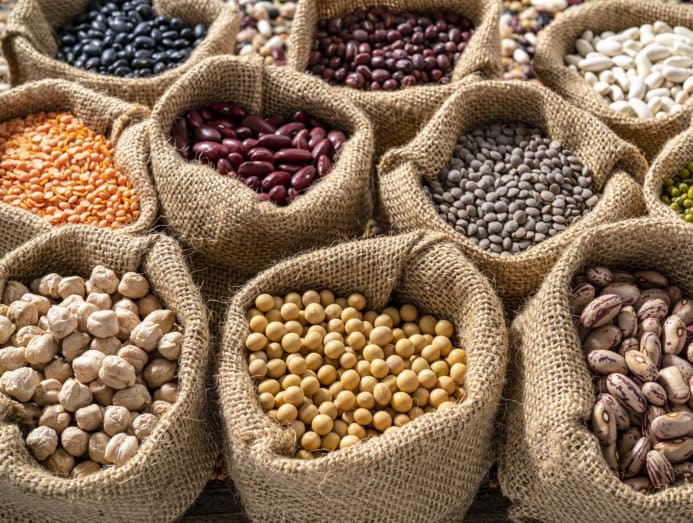
WHY DO OLDER PEOPLE STILL NEED PROTEIN?
Grandpa and Grandma may not be stacking weights in the gym but maybe they should in order to stave off sarcopenia or age-related muscle loss. It’s one of the reasons that leads to increased frailty, falls and fractures among this group.
Sarcopenia is another reason why those aged 65 and above need more protein than a younger person: 1.2g/kg per day. “For example, a 70kg older adult would need around 70g to 84g of protein daily,” said Chiam.
“Protein helps in muscle repair and growth,” said Chiam. But it has to go hand-in-hand with exercise, especially weight-bearing or resistance exercises, she added. “Combining sufficient protein intake with exercise creates a synergistic effect that can significantly reduce the risk of sarcopenia.”
Unfortunately, many elderly people aren’t meeting their protein requirements as their stomachs have shrunk with age, making them easy to feel full and unable to tolerate the amount of protein they need to eat, she said.
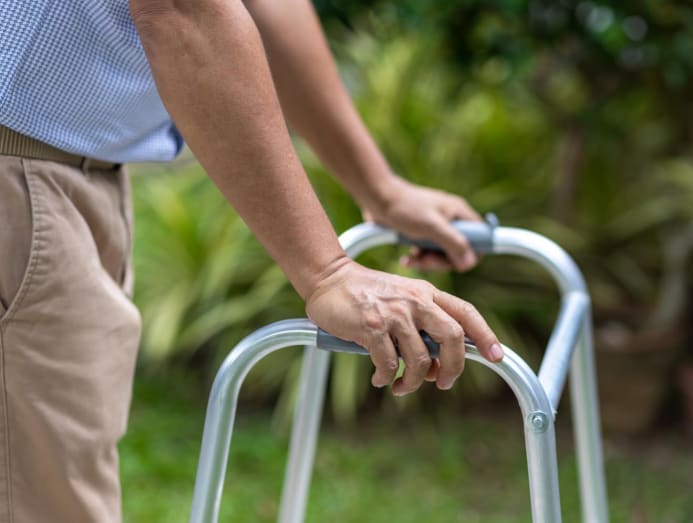
Ageing can also reduce their appetites due to the changes in taste, smell or appetite-regulating hormones. Older folks may find it physically challenging to chew and consume protein-rich foods, said Chiam. “Some elderly individuals may have dietary restrictions or preferences that unintentionally limit protein intake.”
To address those concerns, Chiam has the following strategies to help older adults meet their protein needs:
- Address eating difficulties: Ensure meals are soft and easy to chew if dental problems are a concern, or modify food textures to suit their preferences and abilities. Smoothies with ice cream and creamy peanut butter can make a good, tasty and safe protein source.
- Plan and prepare meals mindfully: Help with meal preparation by including protein-rich foods such as lean meats, dairy products, legumes, nuts and seeds. Or arrange for meal delivery services that cater to nutritional needs. For those with dietary restrictions, suggest alternative protein sources such as tofu, tempeh or protein-enriched foods.
- Incorporate protein supplements: Protein shakes or supplements can be a convenient way to boost protein intake.









